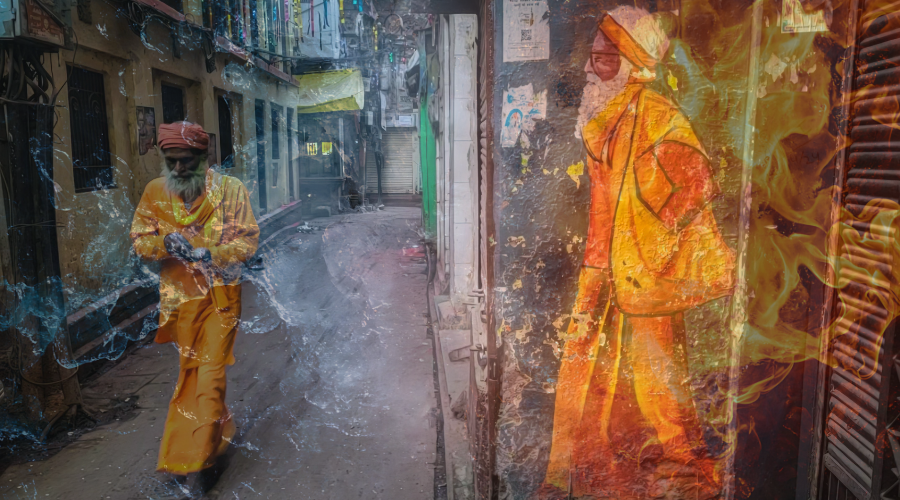Philosophical reflections on the meaning of life might seem outdated. In spaces like LinkedIn and amidst the AI revolution, it can feel pretentious or even laughable to discuss this topic seriously. Who has the right to speak about this with any degree of seriousness? Haven't enough ancient and modern philosophers already weighed in? Aren't there enough religions, leaders, and gurus offering answers? There are.
Yet, the question persists.
It lingers in therapists' offices, with coaches and psychiatrists. It arises in informal conversations among friends. It sits in the quiet corners of your nightstand, in the evening, before you fall asleep. It exists between partners. It stands in the office.
What exactly is the meaning of life? What is my purpose? What is my big "why"? Where did I lose it? When was the last time I saw it? Have I ever truly found it, or has it been a shadow of others' whys? Does this job have a meaning? Is there any meaning in this country, in this economy, idea, approach, company, and its goals?
When someone confronts the question of the meaning of their own existence, you can unmistakably recognize it.
They feel unwell and bad more often. Enthusiasm for daily life diminishes. Desires and pleasures taste like plastic, paper, or, at best, there is no feeling towards them at all.
When the question of meaning arises in a company, among its owners, managers, and employees - conflicts, resignations, sick leaves, lack of productivity, and missed deadlines on a systemic level begin to occur.
Everyone suffers without meaning.
%2520Edition%2520Text%2520Only.jpeg)
In his book "Man's Search for Meaning," Viktor Frankl summarizes and synthesizes the three main things that give life meaning:
1. An Active Life: When a person's creative action in their work or hobbies develops conditions where they express what is valuable to them. This gives life meaning.
2. A Passive Life: When a person enjoys and appreciates their surroundings - nature, art, beauty, etc. In this state, they "float" through life and find meaning in seeing and feeling its beauty.
3. A Life of Pain and Difficulties: When meaning can be found in how we choose to show up and go through them. Under such conditions, personal and deep freedom of will preserves and constructs meaning.
Frankl states that, unfortunately, few people, under endless suffering and challenges, manage to find the strength within themselves to decide who they want to be and how they want to go through the pain. Those who do are examples of incredible resilience and spirit.
"What doesn't kill me makes me stronger" is not a line from a Kelly Clarkson’s song, but a Nietzsche’s thought, which Frankl himself cites to summarize this third way of finding meaning.
His reflections are contextualized by World War II, his own experience in concentration camps, and his professional path as the founder of Logotherapy (he is a psychologist, psychiatrist, neurologist, and a philosopher). In other words, Viktor Frankl's life serves as the "perfect" arena where he could observe himself and countless others with a dose of professionalism in conditions of the most brutal loss of any external factors for finding meaning in existence.
ADDITIONAL PERSPECTIVES ON THE MEANING OF LIFE
While Frankl’s insights provide a robust framework, there are other perspectives worth considering to enrich our understanding of life’s meaning:
· Existentialism: Philosophers like Jean-Paul Sartre and Albert Camus argue that life inherently lacks meaning, and it is up to individuals to create their own purpose through choices and actions. This perspective empowers individuals to shape their destiny and find personal significance in their experiences.
· Humanism: Humanistic psychology, represented by figures like Carl Rogers and Abraham Maslow, emphasizes the inherent potential and self-actualization of individuals. According to this view, meaning is found through personal growth, fulfilling relationships, and achieving one's potential.
· Mindfulness and Presence: Inspired by Eastern philosophies, mindfulness practices encourage living in the present moment. The meaning of life is found in the simple act of being present, appreciating each moment fully, and fostering a deep connection with oneself and the world around.
· Service to Others: Many find meaning through altruism and contributing to the well-being of others. This perspective suggests that purpose arises from the impact we have on other people's lives and the legacy we leave behind.
· Spirituality and Religion: For many, meaning is deeply rooted in spiritual beliefs and religious practices. Faith, rituals, and a connection to a higher power can provide a profound sense of purpose and direction.
Here arises an important question:
In the 21st century, specifically in the Western world, are Frankl's reflections on where to seek the meaning of life still relevant?
In creative work that aligns with what is valuable to us; in the enjoyment of our surroundings—nature, art, beauty; in accepting hardships and difficulties as meaning in themselves?
WE BELIEVE THEY ARE.
Fundamentally, people need one or a combination of these to feel they are living fully.
But, it seems that a new difficulty of our time has emerged.
While Frankl's era was characterized by clearly defined norms of behavior and expectations (gender, professional, societal, class, etc.) before, during, and after World War II, today people live in a world that significantly alters the previous mentality and offers a wide range of choices. Professionally, gender-wise, behaviorally, and role-wise (in the family, in society, etc.), we are given the choice of who to be. Returning to Frankl's insights, however, few people have the strength to make decisions stemming from inner resilience,will, and human dignity. In conditions of uncertainty, instability, insecurity, and threat, most of us lose the light, the clarity, the direction.
WHAT IS THE CONCLUSION?
More than ever today, one must work on training their soul and will. Reading books, engaging in creative work that does not necessarily lead to a reward, reflecting, keeping a diary, contemplating strategically, and believing in something greater than ourselves - are crucial for mental health, resilience, and yes, success. They all amount to ‘critical thinking’ – a ‘must have’ ability in today’s reality of informational overflow.
As for companies and organizations as separate systems, the focus should increasingly be on linking morality and profit, ideologies with work, value with accountability. The alternative is short-term success, long-term harm.
Lastly, while there is a framework for orienting oneself on where to seek the meaning of life, there is no formula that fits all. No two destinies repeat. No organizational paths are cloned.
Therefore, the answers you reach for yourself and your company, the actions you take for yourself and your company, and the beliefs you adopt for yourself and your company - are uniquely yours. Every situation is different, every moment unique. Thus, the decisions about meaning of life must be personal and yours.
Love and support while we all search for meaning
The ILC Team


.avif)



